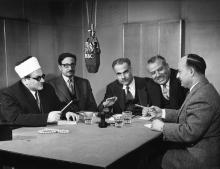Tuning In
Diasporic Contact Zones at the BBC World Service
BBC World Service Arabic Service

As the World Service’s first foray into foreign-language broadcasting (1938) and its first initiative to branch out into non-English-language television (1994-96; 2008-present), BBC-Arabic has played a central role for the Corporation. Distrust of its claims to impartiality, however, persists. To assess both claims and critiques, we examine its politics of translation under four headings: transporting data from the field to the broadcaster; translating from one language into another; transposing data and message by inflexions of tone; and transmitting the result to selected audiences at selected times. We do so from both an etic (‘outsiders’) analysis of BBC output and an emic (‘insiders’) analysis of what audiences perceive and react to by way of critical re-inputs. To understand the discrepancies, we consult political constellations, in-house editorial mechanisms, as well as public criteria of trustworthiness.
Project contact:
Michael Jaber, University of Cardiff, UK, MichaelJaber@hotmail.com
Gerd Baumann, University of Amsterdam, has authored two long-term ethnographies: National Integration and Local Integrity in the Sudan (Oxford UP 1986) and Contesting Culture: Discourses of Identity in Multi-Ethnic London (Cambridge UP 1996). His ten other authored or (co-)edited theoretical volumes include: Civil Enculturation at Schools in Four European Countries (with W. Schiffauer et al.; Berghahn 2004; also in German); The Multicultural Riddle: Re-Thinking National, Ethnic and Religious Identities (Routledge 1999; also in five translations since) and Grammars of Identity / Alterity: A Structural Approach (with Andre Gingrich, Berghahn 2004; also in Spanish 2010). He has worked on the AHRC / OU research project on the BBC World Service since 2006, contributing to and co-editing four Special Issues of the Journals listed in the Project Bibliography.
Project members:
- Politics of Translation


